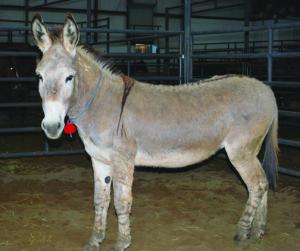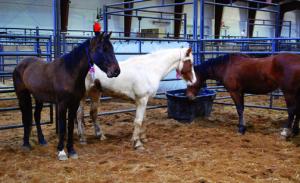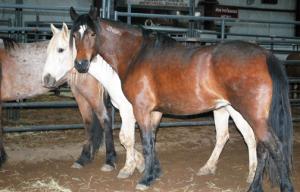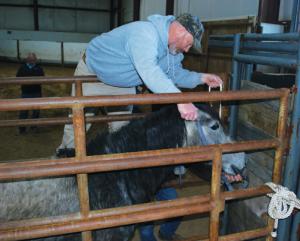By Tommy Brannon
What if there was a place where you could shop for a horse like you shop for items in a store? Horses milling around in a pen munching on hay; you select a cute gray mare or a stout bay gelding, fill out some paperwork, pay a nominal fee, and haul it home. Well, there is!
Arena One in Batesville, Mississippi was the site of a Bureau of Land Management (BLM) Mustang Adoption, April 7-8, 2017. Curtis Patrick with the BLM said they brought 33 horses and 5 burros for adoption. In addition, three horses were brought for pick up that had already been purchased from BLM’s Internet auction. Some Mustangs came from the holding facility in Erwin, Illinois and some from Pauls Valley, Oklahoma. This is the first time there has been a Mustang adoption at Arena One, and Curtis said that if it went well, there may be others in the future. Originally, he had not planned to haul in any burros for this event, but, as it turned out, they were the first animals to be adopted. He added that burros are popular for pets and coyote control. Burros will attack a coyote that is stalking the herd or home, keeping it at bay.
BLM’s Internet auction has become very popular. People can log on and see videos of various horses, fill out an application, get a bidding number, and participate in a live auction. Some of the auctions accept bidding for 5 to 9 days. There was a yearling filly that sold for $2,000 last month.
Curtis said that some Mustangs get a little bit of handling, especially those that are in one of the prison training programs. In these programs, prisoners learn to handle horses and teach them to be halter broke, stand to be groomed, and pick up their feet for trimming. In some cases the horses are broke to ride. The prisoner training programs teach the prisoners a lot of patience, because trying to train and handle a wild Mustang with force does not work!
Most of these Mustangs, however, had had little to no previous handling. They are kept in 24 x 24 pipe gate pens in groups of about 5-7 horses for the adoption. At this particular adoption, the pens were set up inside the arena and there was fresh water provided in a trough and plenty of hay. These are wild horses and very hardy, so they are only fed hay. They looked un-groomed, as one would expect, but otherwise quite healthy with a body condition score of perhaps a 4 or 5. They had also had their vaccinations.
On the outside of each pen was a sign listing each horse by gender and a brief description, as well as the state where it was picked up. The sign also listed those Mustangs in the pen that had already been adopted and were awaiting transportation. In the holding pens, the Mustangs were exposed to lots of human activity and noises. Playing a radio for example, let them hear and get used to many different human voices and sounds. The horses standing in their pens looked pretty bored even with all of the activity going on around them.
In addition to the sign on the pen, each Mustang has a freeze brand on its neck that identifies that horse specifically. Years from now anyone will be able to trace a particular horse’s history and origin. Most of the stallions had been gelded and those that had not, were no confined together so they wouldn’t fight. Although BLM does not check mares for pregnancy, they quite often are. Many of the foals by their dam’s side were born in captivity.
The Mustang adoption program has specific requirements for adoption. BLM retains ownership for a year, so the horse cannot be re-sold. Adopters file a four-page application/affidavit agreeing to the terms of adoption, including the size of pasture with adequate shelter for the horse. The adopted Mustang is subject to random visits by BLM employees to assure adopters’ compliance and the horse’s welfare.
Curtis explained: “We do not require that the horses are broke to ride. The only thing that we ask is that they are halter broke, load in a trailer, can be groomed all over, and will pick up all four feet for the farrier and veterinarian.”
Gentling is the only method that BLM approves for Mustang training. The Mustang Heritage Foundation, in conjunction with BLM, administers a Trainer Incentive Program (TIP) wherein professional trainers using natural horsemanship methods can train Mustangs to the BLM requirements for adopters.
Safety is a top priority at a Mustang adoption – both for horses and humans. These horses have not been taught to lead or load, but have been chute loaded several times by the time they get to this adoption. The horses are herded into a chute by experienced BLM employees, where halters are put on them if desired, and are loaded in to a safe stock trailer where they are free to move about. Gates are set up so that each horse has no escape and must load. One particular horse hauler at this adoption arrived from Louisiana with a trailer with a back ramp. It was explained to him that the mustangs could not be loaded safely on a ramp. Rather than turn him away, the BLM cowboys devised a way to safely load his three horses, sending them down a chute and through the front escape door on the trailer.
Several people adopting Mustangs at Arena One had done so before. Crystal and Mary Ella Brasher from Charleston, Mississippi picked out a bay gelding. Crystal said, “I have a thing for bays. I have 27-year-old bay Mustang who is the smartest horse. We run a portable petting zoo for birthday parties called Crystals’ Party Animals. We have five minis, two Quarter Horses, two Mustangs, and three mini donkeys.
Reagan Box, who is a trainer at Arena One, said that she was adopting a 5-year-old stallion that was about 13 hands high. She said they plan to have him gelded and he will stay at Arena One.
Melinda Hubbard of Batesville, Mississippi picked up two burrows, one Paint, and a gray mare.
Michelle Roshto hauled from Zachary, Louisiana to Batesville to pick up three horses that she had purchased on BLM’s online auction. She said that she and her partner had previously adopted three Mustangs and bought one. She said,” Mustangs are smart and hardy. If you know what you are doing they are easy to train and dependable.”
Find out more about Mustang Adoption events at: https://www.blm.gov/programs/wild-horse-and-burro/adoption-and-sales/adoption-eventsor at https://www.blm.gov/adoptahorse/and on facebook at: BLM Wild Horse & Burro Program.
What if there was a place where you could shop for a horse like you shop for items in a store? Horses milling around in a pen munching on hay; you select a cute gray mare or a stout bay gelding, fill out some paperwork, pay a nominal fee, and haul it home. Well, there is!
Arena One in Batesville, Mississippi was the site of a Bureau of Land Management (BLM) Mustang Adoption, April 7-8, 2017. Curtis Patrick with the BLM said they brought 33 horses and 5 burros for adoption. In addition, three horses were brought for pick up that had already been purchased from BLM’s Internet auction. Some Mustangs came from the holding facility in Erwin, Illinois and some from Pauls Valley, Oklahoma. This is the first time there has been a Mustang adoption at Arena One, and Curtis said that if it went well, there may be others in the future. Originally, he had not planned to haul in any burros for this event, but, as it turned out, they were the first animals to be adopted. He added that burros are popular for pets and coyote control. Burros will attack a coyote that is stalking the herd or home, keeping it at bay.
BLM’s Internet auction has become very popular. People can log on and see videos of various horses, fill out an application, get a bidding number, and participate in a live auction. Some of the auctions accept bidding for 5 to 9 days. There was a yearling filly that sold for $2,000 last month.
Curtis said that some Mustangs get a little bit of handling, especially those that are in one of the prison training programs. In these programs, prisoners learn to handle horses and teach them to be halter broke, stand to be groomed, and pick up their feet for trimming. In some cases the horses are broke to ride. The prisoner training programs teach the prisoners a lot of patience, because trying to train and handle a wild Mustang with force does not work!
Most of these Mustangs, however, had had little to no previous handling. They are kept in 24 x 24 pipe gate pens in groups of about 5-7 horses for the adoption. At this particular adoption, the pens were set up inside the arena and there was fresh water provided in a trough and plenty of hay. These are wild horses and very hardy, so they are only fed hay. They looked un-groomed, as one would expect, but otherwise quite healthy with a body condition score of perhaps a 4 or 5. They had also had their vaccinations.
On the outside of each pen was a sign listing each horse by gender and a brief description, as well as the state where it was picked up. The sign also listed those Mustangs in the pen that had already been adopted and were awaiting transportation. In the holding pens, the Mustangs were exposed to lots of human activity and noises. Playing a radio for example, let them hear and get used to many different human voices and sounds. The horses standing in their pens looked pretty bored even with all of the activity going on around them.
In addition to the sign on the pen, each Mustang has a freeze brand on its neck that identifies that horse specifically. Years from now anyone will be able to trace a particular horse’s history and origin. Most of the stallions had been gelded and those that had not, were no confined together so they wouldn’t fight. Although BLM does not check mares for pregnancy, they quite often are. Many of the foals by their dam’s side were born in captivity.
The Mustang adoption program has specific requirements for adoption. BLM retains ownership for a year, so the horse cannot be re-sold. Adopters file a four-page application/affidavit agreeing to the terms of adoption, including the size of pasture with adequate shelter for the horse. The adopted Mustang is subject to random visits by BLM employees to assure adopters’ compliance and the horse’s welfare.
Curtis explained: “We do not require that the horses are broke to ride. The only thing that we ask is that they are halter broke, load in a trailer, can be groomed all over, and will pick up all four feet for the farrier and veterinarian.”
Gentling is the only method that BLM approves for Mustang training. The Mustang Heritage Foundation, in conjunction with BLM, administers a Trainer Incentive Program (TIP) wherein professional trainers using natural horsemanship methods can train Mustangs to the BLM requirements for adopters.
Safety is a top priority at a Mustang adoption – both for horses and humans. These horses have not been taught to lead or load, but have been chute loaded several times by the time they get to this adoption. The horses are herded into a chute by experienced BLM employees, where halters are put on them if desired, and are loaded in to a safe stock trailer where they are free to move about. Gates are set up so that each horse has no escape and must load. One particular horse hauler at this adoption arrived from Louisiana with a trailer with a back ramp. It was explained to him that the mustangs could not be loaded safely on a ramp. Rather than turn him away, the BLM cowboys devised a way to safely load his three horses, sending them down a chute and through the front escape door on the trailer.
Several people adopting Mustangs at Arena One had done so before. Crystal and Mary Ella Brasher from Charleston, Mississippi picked out a bay gelding. Crystal said, “I have a thing for bays. I have 27-year-old bay Mustang who is the smartest horse. We run a portable petting zoo for birthday parties called Crystals’ Party Animals. We have five minis, two Quarter Horses, two Mustangs, and three mini donkeys.
Reagan Box, who is a trainer at Arena One, said that she was adopting a 5-year-old stallion that was about 13 hands high. She said they plan to have him gelded and he will stay at Arena One.
Melinda Hubbard of Batesville, Mississippi picked up two burrows, one Paint, and a gray mare.
Michelle Roshto hauled from Zachary, Louisiana to Batesville to pick up three horses that she had purchased on BLM’s online auction. She said that she and her partner had previously adopted three Mustangs and bought one. She said,” Mustangs are smart and hardy. If you know what you are doing they are easy to train and dependable.”
Find out more about Mustang Adoption events at: https://www.blm.gov/programs/wild-horse-and-burro/adoption-and-sales/adoption-eventsor at https://www.blm.gov/adoptahorse/and on facebook at: BLM Wild Horse & Burro Program.










